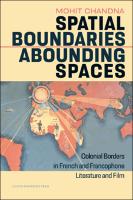Spatial Boundaries, Abounding Spaces
Colonial Borders in French and Francophone Literature and Film
Abstract
Colonialism advanced its project of territorial expansion by changing the very meaning of borders and space. The colonial project scripted a unipolar spatial discourse that saw the colonies as an extension of European borders. In his monograph, Mohit Chandna engages with narrations of spatial conflicts in French and Francophone literature and film from the nineteenth to the early twenty-first century. In literary works by Jules Verne, Ananda Devi, and Patrick Chamoiseau, and film by Michael Haneke, Chandna analyzes the depiction of ever-changing borders and spatial grammar within the colonial project. In so doing, he also examines the ongoing resistance to the spatial legacies of colonial practices that act as omnipresent enforcers of colonial borders. Literature and film become sites that register colonial spatial paradigms and advance competing narratives that fracture the dominance of these borders.
Through its analyses Spatial Boundaries, Abounding Spaces shows that colonialism is not a finished project relegated to our past. Colonialism is present in the here and now, and exercises its power through the borders that define us.
Keywords
Postcolonial Studies;literary geography;human spatiality;francophone literature;colonial borders;19th century French Literature;nation;gender;France;India;Algeria;MartiniqueDOI
10.11116/9789461663832ISBN
9789462702738, 9789461663849, 9789461663832Publisher
Leuven University PressPublisher website
https://lup.be/Publication date and place
2021Grantor
Classification
Literary studies: postcolonial literature


 Download
Download Web Shop
Web Shop